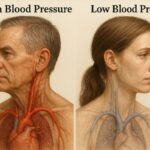Can resistant hypertension be cured or controlled? Resistant hypertension is a type of high blood pressure that is difficult to control or cure with standard treatment methods. It is defined as blood pressure that remains above target levels despite the use of three or more anti-hypertensive medications at optimal doses.
What causes resistant hypertension?
There are several potential causes of resistant hypertension. Multiple factors may contribute to the development of this condition. Some common causes include:
- Poor adherence to treatment. One of the most common causes of resistant hypertension is poor adherence to treatment. This can occur when individuals do not take their medications as prescribed, or when they do not follow other recommended lifestyle modifications (such as eating a healthy diet or getting regular physical activity).
- Underlying medical conditions. Certain medical conditions can contribute to the development of resistant hypertension, including kidney disease, sleep apnea, and hormonal imbalances.
- Medication interactions. In some cases, resistant hypertension may be caused by interactions between different medications that an individual is taking.
Further, there are more general factors related to development of hypertension:
- Lifestyle factors. Poor diet, lack of physical activity, and tobacco use are all lifestyle factors that can contribute to the development of resistant hypertension.
- Age-related changes. As people age, their blood vessels may become less elastic and more resistant to blood flow, which can contribute to the development of high blood pressure.
Can resistant hypertension be cured?
Can resistant hypertension be cured or controlled? It is important to note that resistant hypertension is a chronic condition that may not be completely curable. However, it is generally possible to effectively control and manage resistant hypertension with the right treatment approach. This may involve a combination of medications, lifestyle modifications, and specialized techniques to help lower blood pressure to healthy levels.
The chances of successfully controlling resistant hypertension will depend on a number of factors, including the underlying cause of the condition, the individual’s overall health, and their ability to adhere to treatment. Some people may be able to achieve good blood pressure control with relatively simple treatment approaches, while others may require more complex or intensive treatment.
Treatment options
There are several treatment options that may be used to manage resistant hypertension, depending on the underlying cause of the condition and the individual’s specific needs. Some potential options may include:
Medications
In many cases, resistant hypertension can be effectively managed with medications. These may include:
- Diuretics. These medications help the body get rid of excess sodium and water, which can lower blood pressure.
- Beta blockers. These medications block the effects of the hormone adrenaline, which can help relax the blood vessels and lower blood pressure.
- Angiotensin-converting enzyme inhibitors (ACE inhibitors) or angiotensin receptor blockers (ARBs). These medications help relax the blood vessels and lower blood pressure by blocking the action of a hormone called angiotensin.
- Calcium channel blockers. These medications help relax the blood vessels and lower blood pressure by blocking the flow of calcium into the cells of the blood vessels.
- Alpha blockers. These medications block the effects of the hormone adrenaline, which can help relax the blood vessels and lower blood pressure.
Specialized techniques
In some cases, resistant hypertension may be treated with specialized techniques, such as:
- Renal denervation: This involves blocking the nerves in the kidneys that help regulate blood pressure.
- Baroreflex activation therapy: This involves stimulating certain nerves in the neck that help regulate blood pressure.
- Radiofrequency ablation: This involves using heat to destroy certain cells in the blood vessels that contribute to high blood pressure.
It is important to note that the most effective treatment for resistant hypertension will depend on the underlying cause of the condition and the individual’s specific needs and circumstances. It is important to work closely with a healthcare provider to develop a treatment plan that is tailored to your specific needs.






